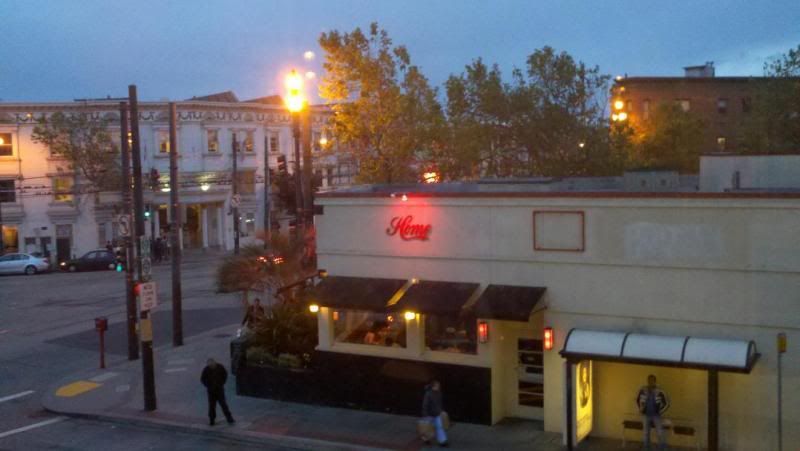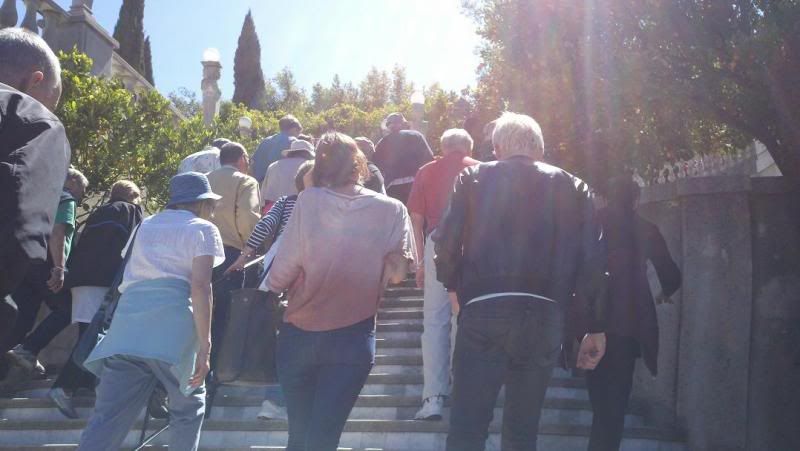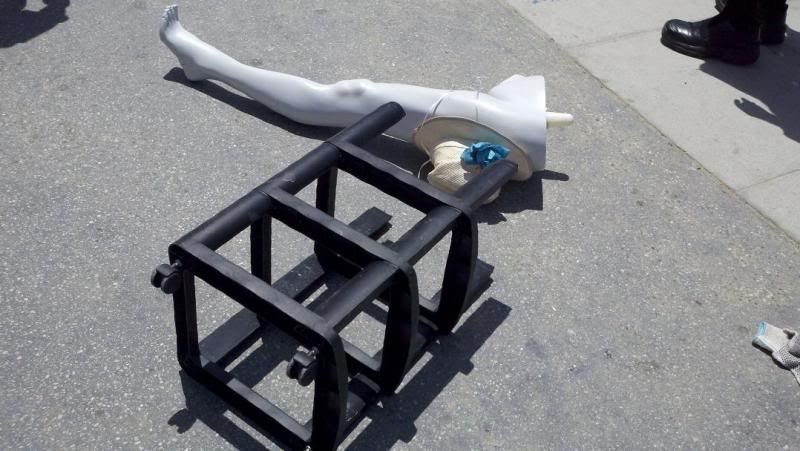Last month, my grandfather passed away. On the day he died, we (my father's five siblings, their spouses, and every one of their twenty mostly-adult children) gathered at my grandfather's home. It wasn't long before one of my cousins had located my grandmother's photo albums, at least two dozen in all. We sat for hours in the living room, passing the photo albums around, laughing at how we all looked. (So many Cosby sweaters. So many mustaches. So many mullets.) Often I would get to the end of an album, and immediately start over from the beginning, sometimes taking more time to look through the album than I did the first time. I could hardly put them down. We stayed for a week, and not a day went by where I did not spend at least one hour looking through the albums.
Photo albums are a dying medium, which is too bad, because there's something intensely personal about them, far more personal than flipping through digital images on a camera or a computer screen. For one thing, most photo albums come from a time before you 1) could take as many pictures as you wanted, 2) could actually see the picture you got right after you took it (which is why so many pictures in photo albums are so weird - see example above - it's a tragedy that we're so quick to delete these kinds of shots from our digital cameras). Plus you had to incur the extra time and cost of getting the pictures developed. And all that came before you even get to the part where you put the pictures in the albums. Photo albums are too inconvenient these days. There are far too many overhead costs and barriers to production.
Wednesday, October 26, 2011
Friday, August 19, 2011
My Reading at Storylab Chicago
A couple nights ago I read at Storylab Chicago. Storylab is held in the back room of The Black Rock Pub - dark wood, fireplace, a few comfortable couches - it's a venue that feels like a place where stories should be told.
The place was packed and the audience was very receptive. I wrote something brand new for this reading and I was pretty pleased with the way it turned out. Click the play button below to hear it:
Thanks to Scott Whitehair for putting this show together and to the other readers for kicking ass.
The place was packed and the audience was very receptive. I wrote something brand new for this reading and I was pretty pleased with the way it turned out. Click the play button below to hear it:
Thanks to Scott Whitehair for putting this show together and to the other readers for kicking ass.
Tuesday, July 19, 2011
Badass Chicago Storyteller Shannon Cason
You know how there are some athletes or musicians that we marvel at simply because they make everything look so damn easy? Shannon Cason is kind of like that as a writer and storyteller.
Last night, I attended Essay Fiesta. It was my intention to drum up a little inspiration for myself. Next month I'm going to be reading at Storylab Chicago, and I've been hacking away at a meandering, unmitigated disaster of a story that I may as well perform in Swahili. I needed a little direction and guidance, to be reminded of what a good story sounds like. Luckily for me, Shannon was on last night's Essay Fiesta bill.
Anyone who has seen Shannon will tell you that the guy can put on a clinic in storytelling. (Don't take my word for it - he's Moth Storyslam's Grandslam Champion of Chicago.) He has an easy, straightforward style that's observant, thoughtful, and hilarious. Consider the opening from his story last night:
You can (and should) hear the rest of Shannon's story at his podcast. (The story starts about 1/3 of the way into the podcast).
Last night, I attended Essay Fiesta. It was my intention to drum up a little inspiration for myself. Next month I'm going to be reading at Storylab Chicago, and I've been hacking away at a meandering, unmitigated disaster of a story that I may as well perform in Swahili. I needed a little direction and guidance, to be reminded of what a good story sounds like. Luckily for me, Shannon was on last night's Essay Fiesta bill.
Anyone who has seen Shannon will tell you that the guy can put on a clinic in storytelling. (Don't take my word for it - he's Moth Storyslam's Grandslam Champion of Chicago.) He has an easy, straightforward style that's observant, thoughtful, and hilarious. Consider the opening from his story last night:
I went to the dentist. Not to the dentist's office, but to the University of Illinois at Chicago School of Dentistry's urgent care clinic... It's where the poor and uninsured can go and get dental care. It's where students - future dentists - can practice. In your mouth. So it's like a beauty or a barber college. Only it's your mouth.Shannon's story hit particularly close to home for two reasons. First, two weeks ago I had four impacted wisdom teeth pulled, so I was literally wriggling in my seat for most of the story. Second, it made me see the draft of my story for what it was - an overcrowded, overcomplicated mess of twisting plotlines and one-liners. Somewhere in there, there's a story. I just have to find it and tell it straight.
You can (and should) hear the rest of Shannon's story at his podcast. (The story starts about 1/3 of the way into the podcast).
Wednesday, June 15, 2011
Video: My Reading at Essay Fiesta
So last month I had the privilege of reading at Essay Fiesta, an awesome monthly non-fiction reading series.
I read a very very abridged version of an essay I've been working on about the name Willy. Let me know what you think!
Special thanks to Pat and/or Melyssa for taking the video (not sure which one of you actually recorded it).
Willy's Essay Fiesta Reading - The Book Cellar May 16, 2011 from Willy Nast on Vimeo.
I read a very very abridged version of an essay I've been working on about the name Willy. Let me know what you think!
Special thanks to Pat and/or Melyssa for taking the video (not sure which one of you actually recorded it).
Willy's Essay Fiesta Reading - The Book Cellar May 16, 2011 from Willy Nast on Vimeo.
Saturday, June 11, 2011
All Signs Point Toward Home
On my arrival in San Francisco, I held my GPS device to the steering wheel with one hand, thankful that there were satellites in the sky guiding me. The roads there worked in three dimensions: north-south, east-west, and up-down. I put my trust in technology to keep me from getting lost, took a seemingly random series of turns, and miraculously arrived where I was supposed to go.
For the most part, the memories of my two-day visit in San Francisco blurred together like the cryptic directions on my GPS. I blindly went where I was told to go. But two particular experiences stick out, both of which occurred on public transportation. I should preface these stories by saying that I have grown very accustomed to the unwritten laws of riding public transport in a big city, where getting from one place to another is a serious, silent business. But not so in San Francisco.
For the most part, the memories of my two-day visit in San Francisco blurred together like the cryptic directions on my GPS. I blindly went where I was told to go. But two particular experiences stick out, both of which occurred on public transportation. I should preface these stories by saying that I have grown very accustomed to the unwritten laws of riding public transport in a big city, where getting from one place to another is a serious, silent business. But not so in San Francisco.
Monday, June 6, 2011
Now You Can Say Wow
Alex Trebek narrated the bus ride to Hearst Castle. He wasn't there in person, of course; his pre-recorded voice played through the bus's PA system. And although it seemed fitting to hire the world's foremost expert on trivia to recite tedious factoids about the size of the hill we were climbing, about the number of years it took to build the road (a seven-mile stretch that is jokingly referred to as Hearst's driveway), about the menagerie on the side of the road that once housed polar bears, it also struck me as touch excessive. (I was the only one who laughed when Trebek reminded us to keep our arms and legs inside the vehicle at all times.) Then again, the construction of Hearst Castle, the one-time residence of late newspaper czar William Randolph Hearst, was a 28-year labor of excess.
Tuesday, May 24, 2011
Everything You Need and More
You will see crazy things there, my friend said. I said that that sounded like fun. I would like to see some crazy things. It was late Tuesday morning, and I only had a couple hours to kill before I needed to start driving north towards San Francisco.
If you read the Wikipedia description for Venice Beach, you might think it sounds like the kind of beach/boardwalk area that only exists in '80s movies with bitchin' soundtracks: "Venice Beach includes the beach, the promenade that runs parallel to the beach ('Ocean Front Walk' or just 'the boardwalk'), Muscle Beach, the handball courts, the paddle tennis courts, Skate Dancing plaza, the numerous beach volleyball courts, the bike trail and the businesses." Skate Dancing? Muscle Beach? Someone hand me my funky neon Ocean Pacific shorts, because I am all over this shit like a Flock of Seagulls.
If you read the Wikipedia description for Venice Beach, you might think it sounds like the kind of beach/boardwalk area that only exists in '80s movies with bitchin' soundtracks: "Venice Beach includes the beach, the promenade that runs parallel to the beach ('Ocean Front Walk' or just 'the boardwalk'), Muscle Beach, the handball courts, the paddle tennis courts, Skate Dancing plaza, the numerous beach volleyball courts, the bike trail and the businesses." Skate Dancing? Muscle Beach? Someone hand me my funky neon Ocean Pacific shorts, because I am all over this shit like a Flock of Seagulls.
Subscribe to:
Posts (Atom)



